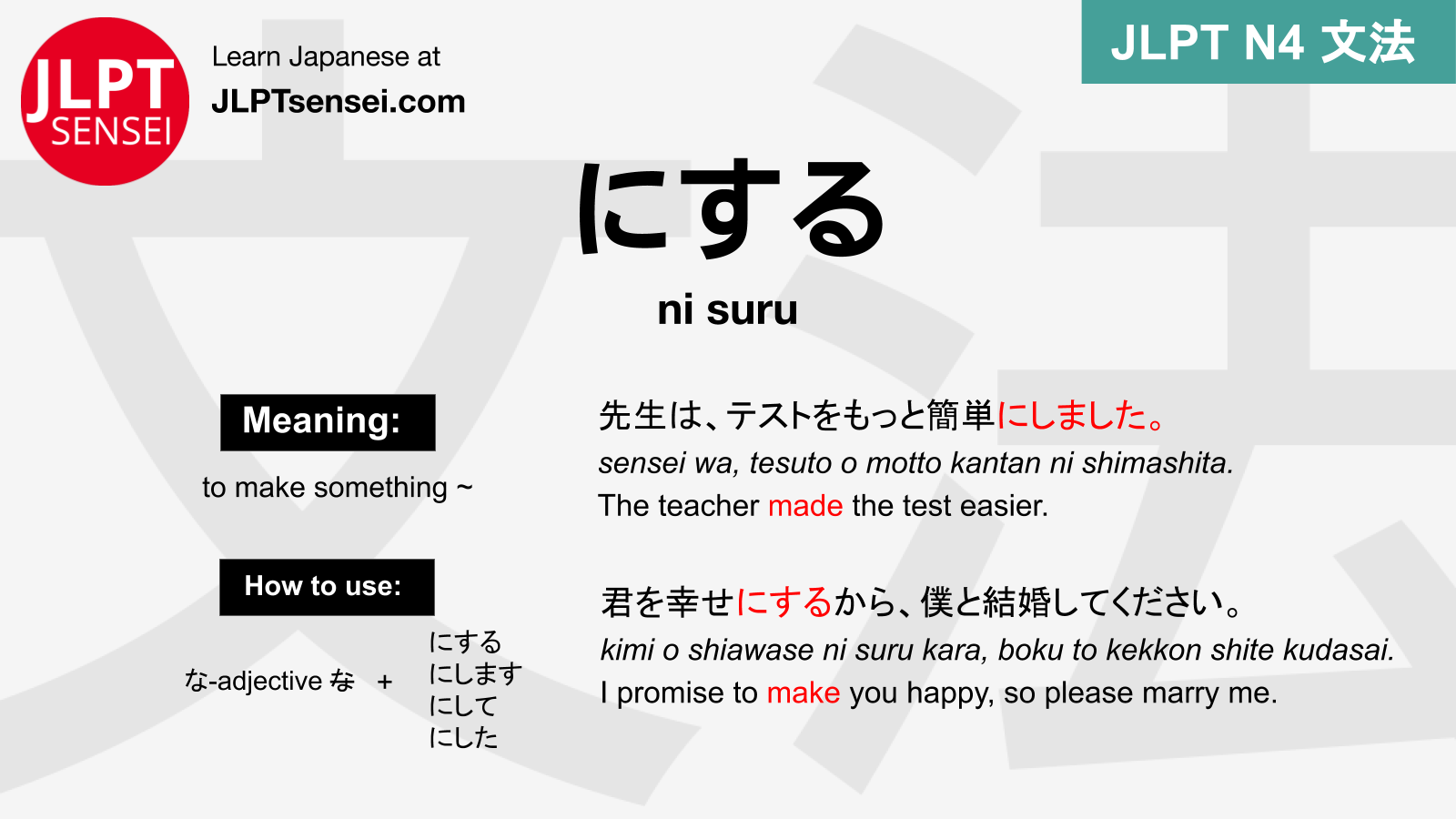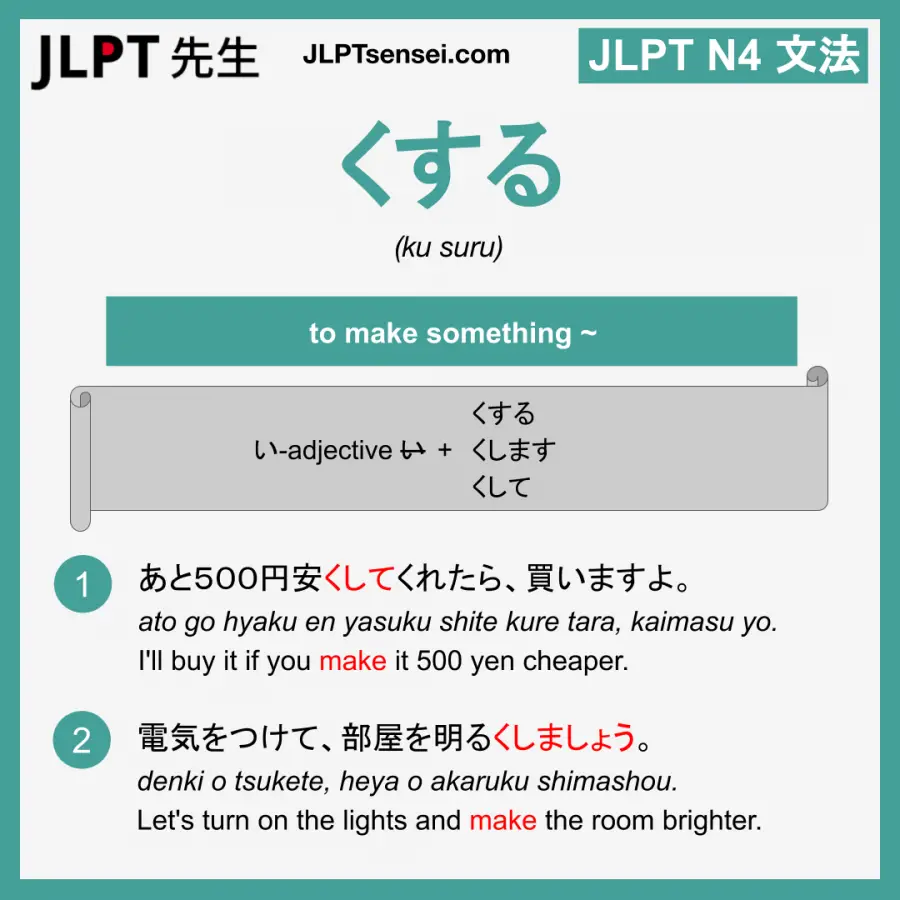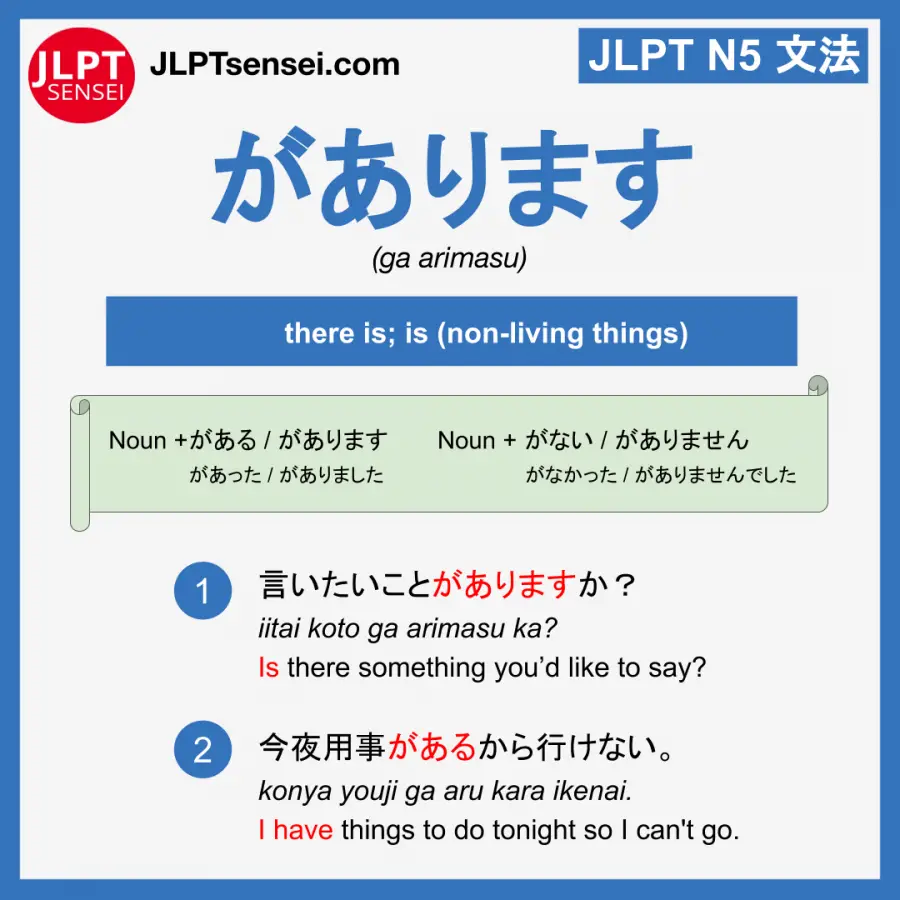
【文法1−2】みんなの日本語初級第44課 〜すぎます(形容詞) にほんご部
JLPT N4 GRAMMAR: ~すぎます (~Sugimasu) ~すぎます indicates that the degree of an action or a state is excessive. Therefore it is usually used with reference to undesirable states. It is classified as a group II verb and therefore conjugates in the same way. 動詞ます形・い―形容詞( い )・なー形容詞( な.

Example sentences using すぎます sugimasu Learn Basic Japanese, Basic
〜すぎ is the noun form of the verb 〜すぎる. In other words, 〜すぎ would be followed by です, and すぎる would become すぎます, in です・ます form. Sometimes these are interchangeable and it just depends if you want a noun or a verb, but in your example 言いすぎる on its own would not have the same meaning.

44課 A1 〜すぎます 日本語教師の応援サイトPart4
V[ ます ]すぎます [い形容詞] い すぎます [な形容詞] な すぎます 日本語能力試験: N4 備考: ネガティブな気持ちの時、使うことが多い。 Used when you are feeling negative. 例文 飲み すぎました 。 I drank too much.

Learn Japanese N4 Grammar With Flashcard Japanesetest4you Com www
たべます -> たべ ます + すぎる; たべ すぎて おなかが痛い (tabe sugite onaka ga itai) I ate too much and now my stomach hurts; Extra Notes: This grammar comes from the verb 過ぎる (sugiru), which means to pass or to exceed. However, this grammar most often written in just hiragana.

JLPT N4 Grammar にする (ni suru) Meaning
c. やさしすぎます。. d. やさしもです。. The correct answer is c. This "too" means "excessively" so the expression " [verb/adjective stem] + すぎ" has to be used. やさしい is an いadjective, so its stem is やさし, not やさしい. Thus the choice a. has to be eliminated. If this "too" means "also (as.

N4 Grammar いこうけい / 思います / つもりです / よていです YouTube
例文 〔V-ます〕+すぎる ちょっと、食たべすぎました。おなかが痛いたいです…。 東京とうきょうでお金かねを使つかいすぎました。もうお金かねがありませんよ。 子こどものころ、ゲームをしすぎましたから、私わたしは目めが悪わ.

【イラスト&英語】「~すぎます」の文法説明 │ Langoal
Maybe it helps you if we translate sugiru as "to be too much". Now we can see that sugiru is really just an obnoxious cousin of あります (arimasu), a verb that means "to be". Realizing it's a verb is very important because we have to conjugate it as one. すぎる (sugiru) by itself becomes すぎます(sugimasu). たべすぎる.

KK(Bentuk Masu)/KS + sugimasu 「すぎます」 Belajar Bahasa Jepang Online
日本語教師のこうすけです😊今日も一緒に日本語を勉強しましょう!!~~~~~質問があったら、いつでもコメントしてください😊 オンライン.

Learn JLPT N4 Grammar ようにする (you ni suru)
JLPT N5 Grammar: すぎる (sugiru) すぎる (sugiru) is a Japanese verb that means "to exceed" or "to be more than.". It is often used to express the idea that something is too much or too many. Form. Verb ます (stem form) すぎる. な-adjective すぎます. い-adjective + Cut off い すぎた. すぎました. すぎて.

ku suru くする くする jlpt n4 grammar meaning 文法 例文 learn japanese flashcards
Once you have found the stem of the verb or adjective, just add すぎる (sugiru) to the end. ★ For example, the stem of the verb 食べます (tabemasu) is 食べ (tabe).Add すぎる (sugiru) and it becomes 食べすぎる (tabesugiru) - eat too much. ★ The stem of the i-adjective 小さい (chiisai) is 小さ (chiisa). Add すぎる (sugiru) and it becomes 小さすぎる.

N5 Grammar があります / がある (ga arimasu / ga aru) Learn Japanese JLPT Sensei
How and when すぎる is used. すぎる is used in Japanese to indicate that the degree of actions or states is excessive and it goes beyond the ordinary state of things. It is not always beneficial to overdo things, to exaggerate, so we find すぎる in sentences with a negative meaning or expressing undesirable states.

N3 Japanese Grammar られてしまう / 始める / かと思った YouTube
Grammar すぎます: Understanding the Verb Ending that Means "Too Much" Greetings, language enthusiasts! Today, we dive deep into the fascinating world of Japanese grammar. One key aspect of Japanese verb conjugation is the ending すぎます (sugimasu).

[N5]Japanese Grammar"about the difference between "どうしますか?" and "何をしますか
すぎる (sugiru) Meaning: too much How to use the: Verb-ます stem + すぎる いadjective (remove い) + すぎる なadjective + すぎる Explain: Expression of exceeding the allowable limit of an behavior or a state. Therefore, the common sentence is often about bad things Example sentences: 1, 太郎、遊びすぎですよ。 Tarō, asobi-sugidesu yo. Taro, you 're playing too.

ことができます" の structure Japanese Language School, Japanese Grammar, Basic
日本の夏は暑すぎ [です・ます]。 The summer in Japan is too hot. Again, in this case, the meaning of the two versions is the same. Just keep in mind that the stem-form version 〜すぎです is often regarded as more informal and colloquial than the verb-conjugated version 〜すぎます.

[N5]Japanese Grammar"あげます/くれます/もらいます/Give and Get"Lesson118[日本語]JLPTN5
English Meaning (s) for すぎます. ichidan verb, intransitive verb. to pass through; to pass by; to go beyond. to pass (of time); to elapse. to have expired; to have ended; to be over. to exceed; to surpass; to be above. to be no more than. (as 〜に過ぎない, etc.) ichidan verb, intransitive verb, suffix.

JLPT N4 文法 ぶんぽう Grammar ~にします。(Choosing and decision) Japanese
There are 56 example sentences available for this grammar point. あまりにも危険すぎる。. It's just too dangerous. amari ni mo kiken sugiru. 食事は早すぎる。. It's too early for me to dine. shokuji wa hayasugiru. それについて話をするのはまだ早すぎる。. It's too soon to talk about that.